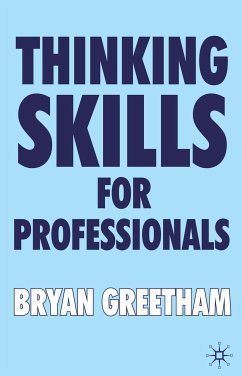
Thinking Skills for Professionals (eBook, PDF)
Versandkostenfrei!
Sofort per Download lieferbar
40,95 €
inkl. MwSt.
Weitere Ausgaben:

PAYBACK Punkte
20 °P sammeln!
This book gives professionals and business people the essential tools to become better thinkers and decision-makers. It sets out simple methods and techniques to avoid poor decision making by developing our conceptual, creative and critical thinking skills, along with ways of incorporating them within our daily lives.
Dieser Download kann aus rechtlichen Gründen nur mit Rechnungsadresse in A, B, BG, CY, CZ, D, DK, EW, E, FIN, F, GR, HR, H, IRL, I, LT, L, LR, M, NL, PL, P, R, S, SLO, SK ausgeliefert werden.












